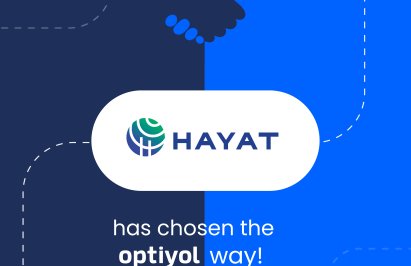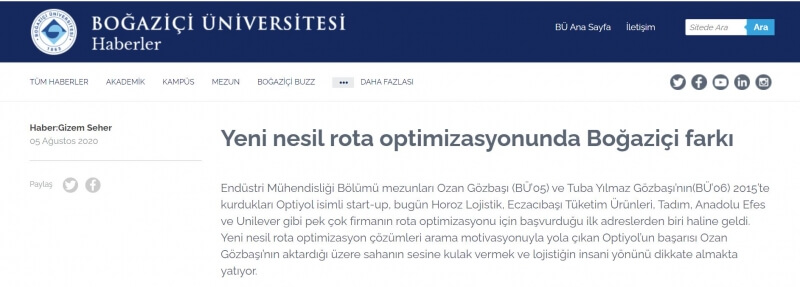
September 05, 2021


Ozan Gözbaşı and Tuba Yılmaz Gözbaşı graduated from Boğaziçi University Industrial Engineering Department and continued to study in Atlanta, GA for M.S. and Ph.D. degrees from Georgia Tech, one of the few engineering and informatics institutions in the world. We talked to Ozan Gözbaşı, who stated that he chose to continue his career as an algorithm engineer in order to contribute to the transformation of academic knowledge into impactful applications on the field, about the entrepreneurship culture in Optiyol and Boğaziçi University.
When was Optiyol founded? How did such a software development idea come about?
Optiyol was founded in 2015. We initially provided services in restructuring the distribution networks of global and local big brands in the FMCG sector. Later, when we received requests from sectors such as logistics, e-commerce and fast consumption for daily dynamic route optimization and observed that the existing solutions did not meet the needs, we decided to develop a new software. With the increase in e-commerce volume and urbanization, supply chains have started to turn direct delivery structure to homes and businesses. Consumers want direct, fast, free and scheduled deliveries; companies are looking for a way to provide a quality service with the least amount of investment in order to remain competitive. While logistics costs are at the level of 5% of the revenue in brick-and-mortar operations, it increases up to 20% in online sales. The distribution network design and route optimization technologies we have developed enable companies to keep costs under control and deliver on time. Compared to their existing planning methods, we enable companies to save 15-25% on fuel and 5-10% on fleet size. "Hearing the voice of everyone on the field is our most important difference"
What are the differences of Optiyol from existing route optimization software?
When we started this business we were investigating different optimization problems; like many people we were thinking: “Are the route optimization problems not solved yet? Companies should have already automated this process”. However, when we went out to the field, we saw that even in very large companies, this work was done manually and based on experience, and the solutions that were tried with great hopes earlier were thrown out after trying for a while. One of the most important shortcomings was the inability to transfer many real-life constraints and preferences to algorithms, and the lack of a balance between cost savings and applicability.
We can say that the most important differences of Optiyol are that it can transfer field experience to algorithms mathematically and offer realistic plans, customize algorithms according to the preferences of each organization, and update algorithms quickly with the information learned from the field. One important aspaect that our users point out is that our team never gives up in tackling hard problems and is open to feedback from anyone to improve our product further.
What kind of services does your company offer other than route optimization?
In addition to daily operational use in urban and intercity route planning, companies sometimes contact us for optimization of their strategic decisions. Some examples are when they want to restructure their distribution networks, or when they think of starting a new logistics company we help them with realistic simulations and appropriate decision support systems.
What are the future goals of Optiyol?
Our goal is to continue to be the pioneer of this business in our country and to provide an indispensable solution for many distribution organizations of different scales. We also take this as a mission to improve the efficiency of logistics for a country which substantially depends on imports for energy and to minimize logistics footprint in big cities who suffer from heavy traffic. On our path to become a global solution provider we started to get our first users abroad in 2020. We aim to achieve a higher growth in 2021 in U.S. and European markets where large-scale pilot studies are planned. We are at the stage of establishing important strategic partnerships, and we think these partnerships will help us reach a wide market abroad.
You have a PhD from one of the leading universities in the engineering discipline, what advantages does academic knowledge bring you in the world of entrepreneurship? How did you decide not to continue your academic life after your doctorate?
In industrial engineering, Boğaziçi University and Georgia Tech are among the most respected institutions in the world with their research experience and academic personnel. The network and the technical expertise we gained in these institutions help us, as startup founders, to build credibility and assure trust in early customers and investors.
Academic studies mostly have a longer-term impact. I found it a more satisfying experience to work as an "algorithm engineer" at a software company where the algorithms get commercialized much faster, touch the real life in a shorter time, and constantly evolve with quick feedback from the people who directly benefit from these solutions.
How were your years at Boğaziçi University? What are the effects of Boğaziçi experience on your entrepreneurship?
I have been at Boğaziçi University between 2000-2005. It was an experience where we both improved ourselves and enjoyed social life with a very intelligent and friendly group of friends. I served on the board of the Operations Research Club, this experience gave us the opportunity to participate and host various events in Europe and Turkey. Quality Summit organizations we organized together with KalDer (Turkish Society for Quality) enabled us to gain early experience in being "customer oriented".